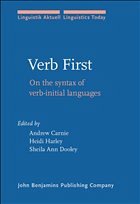Nicht lieferbar

Verb First
On the syntax of verb-initial languages
Versandkostenfrei!
Nicht lieferbar
Main description:This collection of papers brings together the most recent crosslinguistic research on the syntax of verb-initial languages. Authors with a variety of theoretical perspectives pursue the questions of how verb-initial order is derived, and how these derivations play into the characteristic syntax of these languages. Major themes in the volume include the role of syntactic category in languages with verb-initial order; the different mechanisms of deriving V-initial order; and the universal correlates of the order. This book should be of interest to scholars who work on theoretica...
Main description:
This collection of papers brings together the most recent crosslinguistic research on the syntax of verb-initial languages. Authors with a variety of theoretical perspectives pursue the questions of how verb-initial order is derived, and how these derivations play into the characteristic syntax of these languages. Major themes in the volume include the role of syntactic category in languages with verb-initial order; the different mechanisms of deriving V-initial order; and the universal correlates of the order. This book should be of interest to scholars who work on theoretical approaches to word order derivation, typologists, and those who work on the particular grammars of Celtic, Zapotec, Mixtec, Polynesian, Austronesian, Mayan, Salish, Aboriginal, and Nilotic languages.
Table of contents:
- Contributors
- Acknowledgments
- Abbreviations
- Introduction
- Part I. VP movement vs Head-movement
- What fronts?
- Coordination and constituency in St'át'imcets (Lillooet Salish)
- Two derivations of VSO
- Force first
- V1 and wh-questions
- Preverbal particles in verb-initial languages
- A note on predicates and heads in Irish clausal syntax
- Seediq
- VP-internal structure in a VOS language
- Part II. Categories, Information Structure, and Prosodic factors
- Lexical categories, lack of inflection, and predicate-fronting in Niuean
- Word order without syntactic categories
- Nominal properties of vPs in Breton
- On the parallelism of DPs and clauses
- Ordering clitics and postverbal R-expressions in Tagalog
- The syntax of Chalcatongo Mixtec
- Accounting for verb-initial order in an Australian language
- References
- Index
This collection of papers brings together the most recent crosslinguistic research on the syntax of verb-initial languages. Authors with a variety of theoretical perspectives pursue the questions of how verb-initial order is derived, and how these derivations play into the characteristic syntax of these languages. Major themes in the volume include the role of syntactic category in languages with verb-initial order; the different mechanisms of deriving V-initial order; and the universal correlates of the order. This book should be of interest to scholars who work on theoretical approaches to word order derivation, typologists, and those who work on the particular grammars of Celtic, Zapotec, Mixtec, Polynesian, Austronesian, Mayan, Salish, Aboriginal, and Nilotic languages.
Table of contents:
- Contributors
- Acknowledgments
- Abbreviations
- Introduction
- Part I. VP movement vs Head-movement
- What fronts?
- Coordination and constituency in St'át'imcets (Lillooet Salish)
- Two derivations of VSO
- Force first
- V1 and wh-questions
- Preverbal particles in verb-initial languages
- A note on predicates and heads in Irish clausal syntax
- Seediq
- VP-internal structure in a VOS language
- Part II. Categories, Information Structure, and Prosodic factors
- Lexical categories, lack of inflection, and predicate-fronting in Niuean
- Word order without syntactic categories
- Nominal properties of vPs in Breton
- On the parallelism of DPs and clauses
- Ordering clitics and postverbal R-expressions in Tagalog
- The syntax of Chalcatongo Mixtec
- Accounting for verb-initial order in an Australian language
- References
- Index




